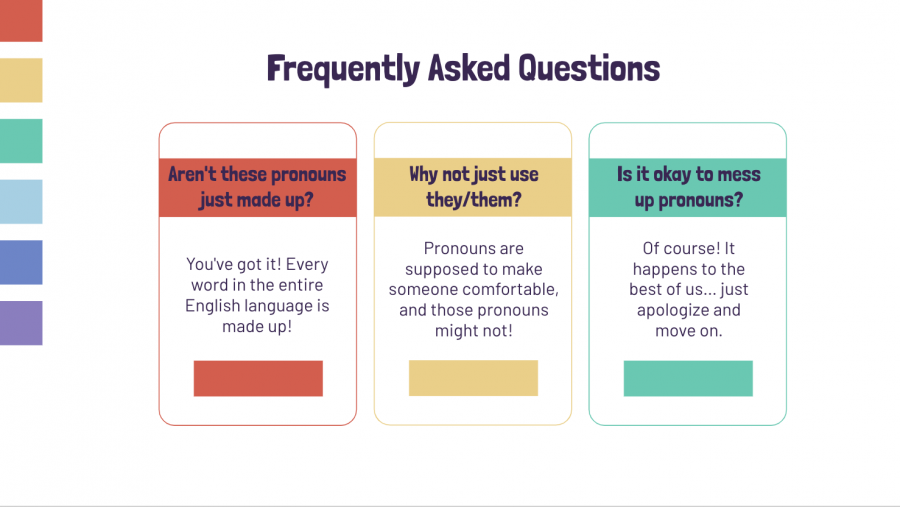Pronouns – let’s talk about them
It was on everyone’s radar as we passed the first weeks of school; some- thing small, yet so monumental. The topic in question: gender pronouns.
On forms inquiring student infor- mation, many WHS teachers this year included whether students preferred to be referred to in a specific way (he/she/they/etc.) on the forms.
Before last school year, there was no organized effort to talk about pro- nouns by the school administration, teachers or parents, so it was a surprise when many teachers decided to address students of varying gender orientations this year.
This was not a sudden decision though. In fact, during a May faculty meeting, the No Place For Hate Committee (NPFH) presented a slideshow about gender identity, answered questions and offered templates with the pronoun question for teachers to utilize for the upcoming school year.
“[NPFH] did a survey…and a majority of the students we asked said that their teachers didn’t put any effort into asking or learning pronouns in general…One student said that teachers would [separate] the class into boys and girls, go to the group you belong in,” said Christina LaPera, part of the leadership with NPFH. “That was just not respectful.”
According to LaPera, in addition to being disrespectful, it was demoralizing to go to school everyday and be misgendered by the same teachers who students assume are committed to fostering a positive learning environment. For LaPera and several gender non-conforming students, something needed to change.
It’s 2021—it’s about time that teachers normalize asking about pronouns. “I think it is very important to refer to students by their chosen pronouns as it is an important part of their identity,” said Principal Mary Asfendis.
Respecting pronouns is a necessity; asking shows interest in a students’ emotional well-being and makes them feel validated about their own identity.
But currently, teachers are not required to include the pronoun question in their classes. Assistant Principal and Advisor of NPFH Warren Hynes said he doesn’t see a mandate happening. “It will just become part of what we do… Sometimes diversity progress happens quickly, and sometimes it doesn’t. But I think we are absolutely on the path to full acceptance of students of all genders at WHS.”
English Teacher Kim Gosen-Fowler said that she “philosophically agrees” with asking the question, but is careful about the comfort levels of the students. If someone doesn’t want to answer they shouldn’t feel forced.
Sammy Bauer, officer of the Young Democrats Club, said, “I think if teachers really want to make sure everybody feels comfortable in their classrooms, asking students their pronouns at the beginning of the year is a step in the right direction.”
Now, more than ever, pronouns are an important topic that people are discussing as inclusion of all students is prioritized. Calling someone by their correct pronouns is a small step teachers can take in order to create a safe environment for their students.
Should every teacher be required to ask students for their pronouns? Yes. As teachers, maintaining an inclusive learning environment is part of their responsibility and in order to keep every student comfortable, teachers should ask and respect the pronouns that make students feel safe.

